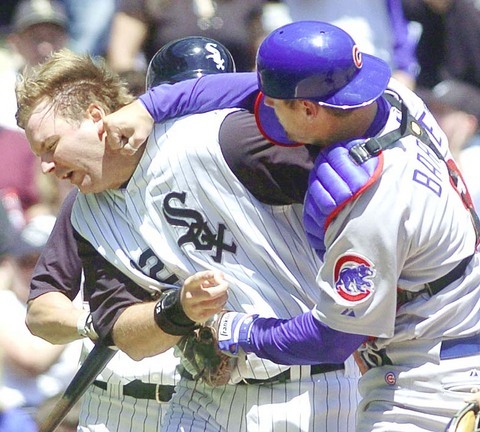Monday, May 5, 2014
When Cross-Town Baseball in Chicago Mattered, And Why It Doesn't Now
Right now I am watching the first game of the inter league series between the Cubs and White Sox being played at Wrigley Field. I can distinctly see some empty seats, which never would have been the case fifteen years ago, even on a cold night such as this. The Cubs-Sox games used to have a kind of elevated, carnival atmosphere to them and an intensity one normally associates with the World Series. The house was packed, the fans went bananas, and some serious bragging rights were on the line.
Of all the interleague games, these were the craziest and the most meaningful. The Yankees-Mets rivalry, for instance, is not nearly so fraught. You will find fans of both teams in all parts of the Tri-State area, but the Yankees are so dominant that the Mets are the one team in the country that does not have a majority of fans in any zip code. Chicago, however, is different. Cubs vs. Sox is really about North Side versus South Side, with all of the class, cultural, and racial divisions that the geographic division implies. (Of course, there are plenty of working class Cubs fans and effete White Sox fans.)
Back when the crosstown series mattered, it was White Sox fans who approached it with particular fervor. The Cubs are Chicago's dominant team in terms of number of fans and media coverage, and their fans also tend to be more affluent. For many White Sox fans, beating the Cubs wasn't just a baseball victory, it was a rare victory in life against the larger forces that bear down on them on a daily basis. In fact, I would say that White Sox fans are much too concerned with the Cubs and getting revenge on them and what they stand for. I remember going to White Sox games in the aftermath of Sammy Sosa's corked bat controversy, and seeing mocking T-shirts for the "Sosa Cork Company" sold by vendors outside of the game. The Sox were playing well that year and in playoff contention, which made the focus on a National League team rather strange.
Since that time, however, the rivalry has dimmed. Some of this can probably be attributed to the fact that interleague play has lost its novelty. (Are you listening, Mr. Selig?) However, a lot of it has to do with the fortunes of the Cubs and Sox since their first crosstown series in 1997. Back then both teams were pretty lame. Sammy Sosa could sock the ball, but the Cubs only won 68 games that year, while the Sox finished just under .500 and their management had traded away veteran pitching in the infamous "White Flag Trade." It was the end of July, and the Sox were only 3.5 games out when management decided not to contend. Needless to say, that didn't exactly excite the fan base. With both teams not threatening to win the pennant, it's only natural that fans could channel their energy into a crosstown series.
That situation didn't last forever. In 1998 the Cubs won the wild card, and in 2000 the Sox won the division. The Cubs' postseason ordeal in 2003, exemplified by the Bartman Game, gave Cubs fans something much worse to rue about that losing a single regular-season interleague series. Then, two years later in 2005, the Sox won the World Series, something that mattered a whole helluva a lot more than who won in May or June between the two teams. The White Sox had finally won a championship for the first time since 1917, while the Cubs' last victory, in 1908, has now gone well past its centennial. Winning the Series has made most sane Sox fans drop their obsessive Cubs hatred (or at least mitigated it), and the Cubs' current problems are so deep that winning games against the South Siders is cold comfort. There was one last gasp of the old rivalry in 2006, when an aggressive play at the plate by AJ Pierzynski led to a benches-clearing brawl. Since then it's seemed like just another series, and that might not be such a bad thing.
Subscribe to:
Post Comments (Atom)

No comments:
Post a Comment